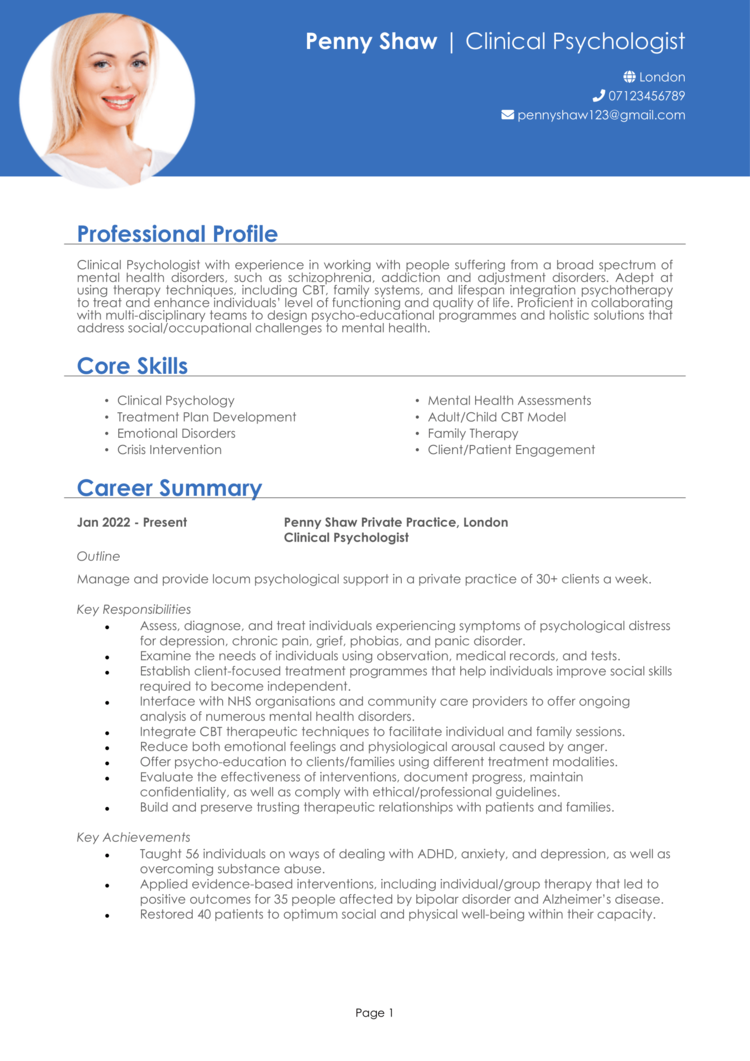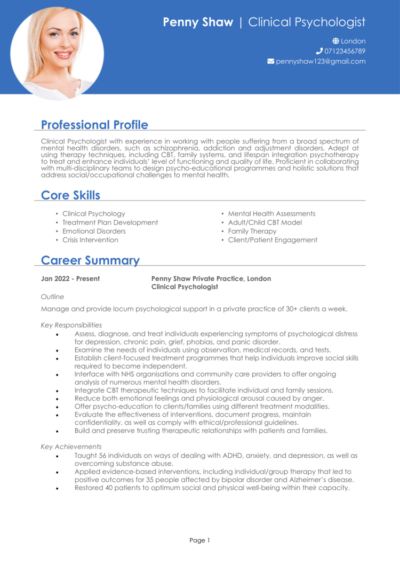You’ve helped people navigate their deepest struggles – but now it’s time to do something far more intimidating: write about yourself.
This guide will show you how to build a Clinical Psychologist CV that reflects your professionalism and expertise – whether you work in hospitals or community care.
With a Clinical Psychologist example CV and advice tailored to clinical roles, you’ll learn how to present your qualifications and experience to land new, rewarding jobs.
Clinical Psychologist CV

How to write your Clinical Psychologist CV
Discover how to craft a winning Clinical Psychologist CV that lands interviews with this simple step-by-step guide.
Your CV needs to reflect more than just your training – it should demonstrate your ability to deliver results in sensitive, high-stakes environments. From formatting each section to how you describe complex casework or outcomes, this guide breaks down the entire process of how to write a CV.
Whether you’re early in your career or stepping into a new specialism, this walkthrough will help you craft a CV that communicates both compassion and competence.
Clinical Psychologist CV format and structure guidelines


As a Clinical Psychologist, your work is rooted in structure – and your CV should be too. Recruiters and healthcare employers want to see your experience, qualifications, and training laid out in a way that’s easy to navigate and professionally presented. Avoidable mistakes are only going to encourage busy recruiters to move onto the next applicant, so follow these CV tips.
Here’s the layout to follow:
- Name and contact details – Ensure your name and personal details are easily visible at the top. A photo is optional and depends on the role.
- Profile – Craft a short introduction that showcases your professional background and key accomplishments.
- Core skills – Provide a quick overview of your top skills that show why you’re a great fit.
- Work experience – Outline your career progression in reverse order, emphasising your contributions and successes.
- Education – Provide details on your academic background, including certifications or specialised training.
- Additional info – You can add hobbies or activities here that reflect your enthusiasm for the industry.
Make sure your sections are clearly labelled and logically ordered. Use bullet points to break up large bodies of text and ensure readability. Stick to a simple, legible font and avoid clutter – white space is your friend. Keep your CV length to two pages or fewer, and ensure each detail earns its place. Coherent CV formatting signals organisation and an understanding of what employers value in healthcare settings.
Creating a strong Clinical Psychologist profile


This opening paragraph is your opportunity to provide a clear overview of your clinical expertise, client focus, and therapeutic approach. It should convey where you’ve trained and worked, and the positive impact you’ve made through your interventions.
Keep the CV profile grounded and professional – you’re not trying to sell, just to communicate the value and benefit you bring to any employer or service team. Make recruiters understand what makes you the ideal hire.
Clinical Psychologist CV profile examples
Profile 1
Experienced Clinical Psychologist with over 10 years supporting adults with complex mental health needs in NHS and private settings. Skilled in delivering CBT, psychodynamic therapy, and risk assessments. Strong background in multidisciplinary collaboration and treatment planning, with a focus on recovery-oriented care.
Profile 2
HCPC-registered Clinical Psychologist with seven years of experience working with children and adolescents across CAMHS, schools, and specialist inpatient services. Proficient in psychological formulation, therapeutic interventions, and outcome measurement. Committed to trauma-informed, person-centred approaches.
Profile 3
Dedicated Clinical Psychologist with five years of post-qualification experience in neuropsychology and rehabilitation services. Experienced in conducting detailed assessments, cognitive testing, and therapeutic interventions for individuals with brain injury and neurological disorders. Strong report-writing and diagnostic skills.
Details to put in your Clinical Psychologist CV profile
Include the following:
- Where you worked – State the type of organisations or services you’ve worked in (e.g. NHS, private practice, CAMHS, forensic services).
- Your top qualifications – Mention your doctorate and any additional accredited training or registrations.
- Essential skills – Briefly describe your clinical methods, diagnostic skills, and client engagement techniques.
- Client groups – Specify whether you’ve worked with children, adults, older adults, or specialist groups.
- Value delivered – Mention how your interventions have improved client outcomes, supported MDTs, or contributed to service development.
Show off the core skills recruiters look for


This section provides a concise overview of your clinical and technical capabilities – the specific, evidence-based skills that are central to your role. Employers want to see clear reference to psychological assessments, therapeutic modalities, treatment planning, safeguarding awareness, and inter-agency collaboration.
Focus on tangible, hard CV skills – the things a job spec might list directly. Tailor them to your target role. Avoid vague language like “passionate about helping people” and centre your core competencies instead.
Most important skills for a Clinical Psychologist
- Psychological Assessment and Diagnosis – Conducting clinical interviews, administering standardised tests, and formulating mental health diagnoses.
- Therapeutic Intervention Delivery – Implementing evidence-based therapies such as CBT, DBT, or psychodynamic approaches to support client wellbeing.
- Treatment Planning and Evaluation – Developing tailored care plans and regularly reviewing progress to ensure effective outcomes.
- Report Writing and Case Documentation – Producing clear, detailed clinical notes, assessment reports, and formal communications for stakeholders.
- Risk Assessment and Management – Identifying and managing risks related to self-harm, suicide, or safeguarding concerns with appropriate interventions.
- Supervision and Clinical Governance – Participating in professional supervision and adhering to ethical and legal standards of psychological practice.
- Multidisciplinary Team Collaboration – Working alongside psychiatrists, social workers, nurses, and educators to deliver coordinated care.
- Research and Evidence-Based Practice – Engaging in research or service evaluation to inform clinical work and contribute to the evidence base.
- Service User Engagement and Advocacy – Involving clients in treatment decisions and advocating for their mental health needs and rights.
- Cultural and Contextual Competency – Delivering psychologically informed care that respects diverse backgrounds, identities, and experiences.
Describing your work experience


Your clinical work is your strongest evidence – this section should demonstrate the range, depth, and effectiveness of your professional experience. That includes not just where you worked, but how you delivered care, supported recovery, collaborated with teams, and contributed to service improvement.
List roles from most recent to oldest. Each entry should begin with a short paragraph summarising the setting, the team, and your clinical role. Then use bullet points to outline key responsibilities and achievements. Where relevant, include placements from your doctorate, especially if you’ve got relatively little professional work experience.
What’s the correct way to structure job history on your CV?

- Outline – Introduce the clinical setting, client group, and nature of your role – for example, “Working within a multidisciplinary CAMHS team, providing one-to-one therapy to young people.”
- Responsibilities – Use action words like “delivered” and “formulated.” For example: “delivered CBT to clients with anxiety disorders” or “formulated care plans as part of MDT meetings.” Mention assessment tools and therapy models.
- Achievements – Highlight contributions such as successful discharge rates, positive outcome measures, innovations in service delivery, or positive feedback from clients or supervisors.
Sample work experience for Clinical Psychologists
Clinical Psychologist | Westvale NHS Mental Health Trust
Outline
Provided psychological services to adults with severe and enduring mental health conditions in a community-based team.
Responsibilities
- Delivered individual and group therapy sessions using CBT and third-wave approaches
- Completed psychological assessments and contributed to multi-agency care plans
- Formulated complex cases using biopsychosocial models
- Supervised assistant psychologists and trainee clinicians
- Prepared risk assessments and contributed to safeguarding reviews
Achievements
- Improved therapy engagement rates by 22% by developing new patient resources
- Supported service reconfiguration project that enhanced multidisciplinary coordination
- Delivered training sessions for 30+ staff on trauma-informed care practices
Clinical Psychologist | Brookwood CAMHS, NHS Foundation Trust
Outline
Provided psychological assessment and intervention for children and adolescents referred through primary and secondary care pathways.
Responsibilities
- Assessed emotional, behavioural, and developmental difficulties using standardised tools
- Delivered evidence-based therapy including CBT, DBT-informed work, and family sessions
- Wrote detailed clinical reports for EHCP and safeguarding processes
- Worked closely with schools, social services, and paediatric teams
- Participated in MDT meetings to guide treatment pathways and risk management
Achievements
- Reduced waiting time for psychological reports by implementing a streamlined format
- Developed a resource pack for parents of children with ASD, now used trust-wide
- Recognised for clinical leadership during complex multi-agency cases
Clinical Psychologist | Arcadia Neuro Rehab Centre
Outline
Supported inpatient neurorehabilitation services for adults with acquired brain injury and neurological conditions in a multidisciplinary setting.
Responsibilities
- Conducted neuropsychological assessments and cognitive screens
- Delivered behavioural interventions to manage adjustment and mood disorders
- Contributed to discharge planning and family education
- Liaised with speech therapists, physiotherapists, and occupational therapists
- Produced outcome-focused reports for funders and clinical leads
Achievements
- Improved goal attainment scores across caseload through collaborative care planning
- Created psychoeducational materials used in patient recovery programmes
- Reduced behavioural incidents by 35% through targeted intervention planning
What should your CV’s education section include?


In psychology, education and professional training form the backbone of your career. You’ll need to clearly present your academic history, including undergraduate and postgraduate qualifications, in reverse chronological order.
State your doctorate in Clinical Psychology at the top, followed by your undergraduate degree and any relevant certificates or CPD. If you completed placements, research, or dissertations relevant to your current career path, summarise those briefly too.
What qualifications do employers look for in a Clinical Psychologist?
- Doctorate in Clinical Psychology (DClinPsy) – Required to practise as a Clinical Psychologist in the UK
- BSc (Hons) Psychology – Undergraduate foundation required for postgraduate study
- HCPC Registration – Mandatory for all practising Clinical Psychologists
- BABCP-accredited CBT Training – Adds recognised therapy specialism to your core qualification
- Safeguarding Level 3 Certificate – Essential for working with vulnerable groups





